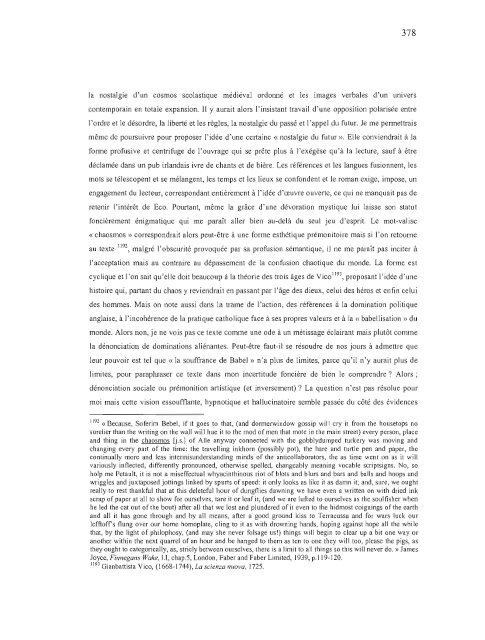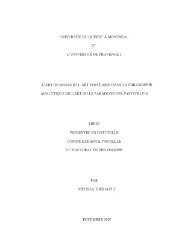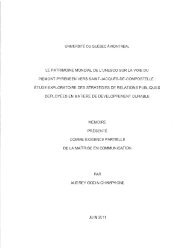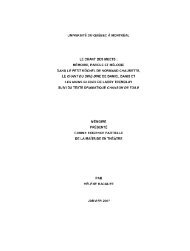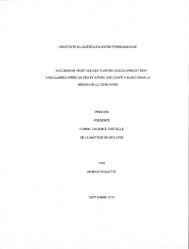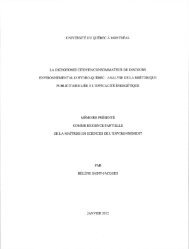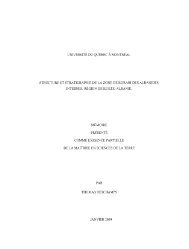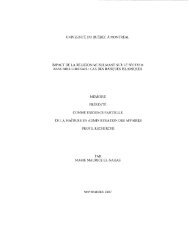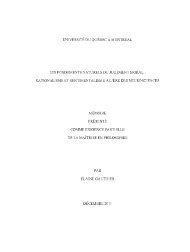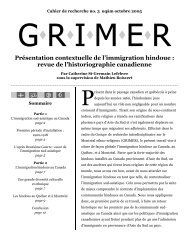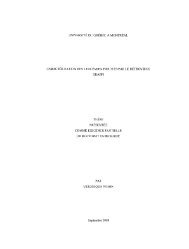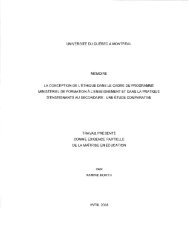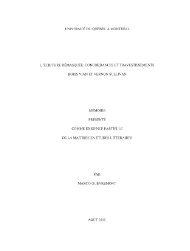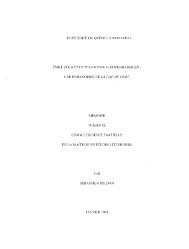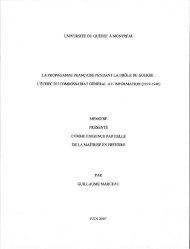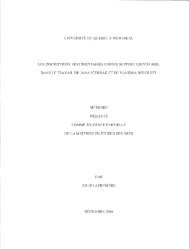- Page 1 and 2:
UNIVERSITÉ DU QUÉBEC À MONTRÉAL
- Page 4 and 5:
REMERCIEMENTS L'occasion est belle
- Page 6 and 7:
Parmi d'autres encore, je relèvera
- Page 8 and 9:
CHAPITRE III ACHÈVEMENTS D'UN PARC
- Page 10:
RÉSUMÉ Ce travail est fondé sur
- Page 13 and 14:
engagements en faveur de l'éducati
- Page 15 and 16:
une finalité ou un aboutissement.
- Page 17:
les animaux qui l'entourent 10, il
- Page 20 and 21:
voir ». Le « style 22 » est ains
- Page 22 and 23:
Pour le travail, Dominique Méda no
- Page 24 and 25:
préjudice, pourtant elle me paraî
- Page 26 and 27:
même, il n'est pas étonnant que l
- Page 28 and 29:
pas la part trop belle au concept e
- Page 30 and 31:
signifie nous-mêmes. Cela se produ
- Page 32 and 33:
souvent d'une appropriation chaotiq
- Page 34:
proposait sont devenues directement
- Page 37 and 38:
«pré-romantique », se situe déj
- Page 39 and 40:
une science du beau, ce qui sera un
- Page 41 and 42:
fâcheuses récupérations politiqu
- Page 43 and 44:
Je m'intéresserai ensuite à d'aut
- Page 45 and 46:
progressivement à entériner compl
- Page 47 and 48:
portait déjà de multiples hérita
- Page 49 and 50:
esthétiques de la Renaissance puis
- Page 51 and 52:
PREMIÈRE PARTIE L'ART DEVENANT SUJ
- Page 53 and 54:
mais les multiples embranchements d
- Page 56 and 57:
egard subjectif sur cette forme qui
- Page 58 and 59:
qui reste de ses paroles à ce suje
- Page 60 and 61:
pierres tombales gothiques dans le
- Page 62 and 63:
successeurs de Bodel sera le très
- Page 64 and 65:
dit Burckhardt, « peut tout, qui o
- Page 67 and 68:
extraction. Mais cet inachèvement
- Page 69 and 70:
fondatrice, articulée sur l'espoir
- Page 71 and 72:
symbolique. Selon la définition qu
- Page 73 and 74:
demeurera toujours ». C'est contre
- Page 75 and 76:
l'Assemblée 122 ». Une codificati
- Page 77 and 78:
de la Renaissance se diffuse et son
- Page 79 and 80:
Le cadre qui surplombe l'ensemble e
- Page 81 and 82:
que du génie: les règles qu'on a
- Page 83 and 84:
château dans son ensemble, peut ê
- Page 85 and 86:
créateur originel ne soit pas excl
- Page 87 and 88:
1.9 La construction légendaire de
- Page 89 and 90:
auxquelles il faut prendre part pou
- Page 91 and 92:
empare l74 . Elle est allemande à
- Page 93 and 94:
nation de citoyens d'une même cult
- Page 95 and 96:
celui de l'autre est un produit. Il
- Page 97 and 98:
lecture relative à des styles ou d
- Page 99 and 100:
dépourvu de toute portée métaphy
- Page 101 and 102:
les créer. (...) La forme la plus
- Page 103 and 104:
sont ?212 » Questionnant aussi l'a
- Page 105:
plus, l'antiquité dont on parle es
- Page 109 and 110:
l'idole elle-même, l'individu s'es
- Page 111 and 112:
à la fin de son œuvre dans des di
- Page 113 and 114:
possible relève alors de la doxa,
- Page 115 and 116:
aussi conserver à ['homme, dans le
- Page 117 and 118:
grandes maîtrises. Il me semble qu
- Page 119 and 120:
tout cas la création d'une « réa
- Page 121 and 122:
construction de notre op!OlOn mais
- Page 123 and 124:
112 L'autre espèce de sentiment es
- Page 125:
certain discours cultivé. Il en va
- Page 128 and 129:
aussi sa critique. Ce vide tient au
- Page 130 and 131:
ainsi qu'il peut déduire que le ju
- Page 132 and 133:
Kant comme un universel abstrait à
- Page 134 and 135:
permettant d'en décider c'est que
- Page 136 and 137:
on est aussi amené à se demander
- Page 138 and 139:
conclusions de tels monuments. Car
- Page 140 and 141:
la beauté en énonçant de manièr
- Page 143 and 144:
incommensurable de la pratique et d
- Page 145 and 146:
134 Le fait que ces incidences ne d
- Page 147 and 148:
des faits tourne autour et s'éclai
- Page 149 and 150:
notre corps et de notre être intim
- Page 151 and 152:
involontairement renversée et Pato
- Page 154 and 155:
se demander si ce n'était pas comp
- Page 156 and 157:
achève sa VIlle lettre. « Ce n'es
- Page 158 and 159:
l'ensemblé 81 ». Car la beauté p
- Page 162 and 163:
dorénavant une symphonie, c'est au
- Page 164 and 165:
son plein aboutissement quelques an
- Page 166 and 167:
155 La littérature allemande est p
- Page 168 and 169:
CHAPITRE III ACHÈVEMENTS D'UN PARC
- Page 170 and 171:
concrètement les lois de la nature
- Page 172 and 173:
pour le philosophe, relève du sacr
- Page 174 and 175:
peut penser que l'on ne prend pas v
- Page 176 and 177:
démonstration que fait Hegel de so
- Page 178 and 179:
l'infini dans des figures finies se
- Page 180 and 181:
dissimulation 443 ». Ce serait dè
- Page 182 and 183:
place élevée qu'il y occupait aut
- Page 184 and 185:
173 Il décrit ensuite ce qui const
- Page 186 and 187:
complètement. C'est donc à mon to
- Page 188 and 189:
la différencie et l'oppose à l'en
- Page 190 and 191:
l'honune doit chercher, dans le dom
- Page 193 and 194:
historien des arts avec une curiosi
- Page 195 and 196:
alancement qui nous fait ressentir
- Page 197 and 198:
considère sans autre souci, obliga
- Page 199 and 200:
projet implicite de la démonstrati
- Page 201 and 202:
l'absolu de son lien conceptuel à
- Page 203:
souvent comme le journal d'un indiv
- Page 206 and 207:
comment se sont faits ou défaits s
- Page 208 and 209:
l'éclairage des études réalisée
- Page 210 and 211:
Une formule de Hartman commentant l
- Page 212 and 213:
« Cosmopolis 554 » appartient au
- Page 214 and 215:
d'une marchandisation de l'art au p
- Page 217 and 218:
cherche pas la visibilité puisqu'e
- Page 219 and 220:
- et apollinienne - en tant que ma
- Page 221 and 222:
à penser que, selon Nietzsche 592
- Page 223 and 224:
212 De ce parcours, sûrement trop
- Page 226 and 227:
est nécessaire de comprendre les p
- Page 228 and 229:
souvient peu de ces noms et que la
- Page 230:
penser et de percevoir. Ce que l'on
- Page 233 and 234:
222 Le deuxième type d'explication
- Page 235 and 236:
continuellement la doxa dont parle
- Page 238 and 239:
4.2.2 Décadences et accusations r
- Page 240 and 241:
idées neuves parmi les hommes, nou
- Page 243 and 244:
l'intelligence et demeurent vénér
- Page 245 and 246:
toutes les institutions intellectue
- Page 247 and 248:
tableau sont désormais les formes
- Page 249 and 250:
formalisation créatrice règne imm
- Page 251 and 252:
240 Ton acte toujours s'applique à
- Page 253 and 254:
le fin connaisseur qu'il en était,
- Page 255 and 256:
aspects et aux formes externes 706
- Page 257:
4.2.5 Espace d'action, espace de re
- Page 260 and 261:
pratique de la logique occidentale
- Page 262 and 263:
domaine, particulièrement fertile
- Page 264 and 265:
dans l'œuvre 744 , à tenter par t
- Page 267 and 268:
production dominants 755 ». Pour l
- Page 269 and 270:
proposition explicative. Son influe
- Page 271 and 272:
nombreuses œuvres amassées sur le
- Page 273 and 274:
esoin de publicité, au sens vérit
- Page 275 and 276:
encore, les progrès de la teclmiqu
- Page 277:
personne même des marchands n'est
- Page 280 and 281:
totalitarismes. Il entérinait auss
- Page 282 and 283:
encore un débat soutenu, allait ê
- Page 284 and 285:
stratégies, victoires et défaites
- Page 286 and 287:
Society8/5. Tout comme John Maynard
- Page 288 and 289:
de Bikini 825 en 1946. Pourtant, l
- Page 290:
Francfort, une rencontre entre le j
- Page 294 and 295:
nombre. Comme à tous les niveaux d
- Page 296 and 297:
grands acteurs culturels et économ
- Page 298:
Fondation François Pinault 859 , s
- Page 301 and 302:
l'intervention de l'État - après
- Page 303:
comme de leurs confusions. C'est en
- Page 307 and 308:
progressivement à côté d'une rem
- Page 309 and 310:
disponible pour une éducation coll
- Page 311 and 312:
infrastructures créées vont demeu
- Page 313 and 314:
vont au début en caractériser le
- Page 315 and 316:
par exemple Robert Brasillach 935 ,
- Page 317 and 318:
même du politique et la dissolutio
- Page 319 and 320:
constructiv/ 53 qui s'était notamm
- Page 321 and 322:
Portulan 964 . Point n'est besoin d
- Page 323 and 324:
de représentation, et même toutes
- Page 325 and 326:
encore en tant qu'art depuis l'ext
- Page 327 and 328:
des entreprises artistiques et cult
- Page 329 and 330:
années, une maison d'école au moi
- Page 331 and 332:
construction de Maisons de la cultu
- Page 333 and 334:
englobant et on peut alors se deman
- Page 335 and 336:
décisions politiques. En 1971, sor
- Page 337 and 338: éthique qui lui est essentielle l0
- Page 341 and 342: 5.3.2 L'UNESCO: consécration des c
- Page 343: objective et le libre échange des
- Page 346 and 347: 335 l055 rupture », est maintenant
- Page 348 and 349: de la Conférence générale de l'U
- Page 350 and 351: la convention de l'UNESCO ne prévo
- Page 352 and 353: contrôle l076 ». On est ainsi fon
- Page 354 and 355: arts numériques l079 ». Ce faisan
- Page 356 and 357: dans le spectacle marchand, la repr
- Page 358 and 359: sources auxquelles puise cet « amo
- Page 360 and 361: expositions pour compléter l'illus
- Page 362 and 363: plus - ou n'est plus alimenté par
- Page 364 and 365: fait. 11IZ " [ ... ] À partir du m
- Page 366 and 367: semble pas pOlter tout à fait le m
- Page 368 and 369: convoitise d'un public qui, l'accep
- Page 370 and 371: programmation totale de tous les é
- Page 372 and 373: du système social de l'art qui est
- Page 374 and 375: traditions orthodoxes, nous revient
- Page 376 and 377: sollicitations dont la formulation
- Page 378 and 379: dans son sens spécifique. Ainsi, l
- Page 380 and 381: Promote living art, anti art, promo
- Page 382 and 383: fait refaire en 1964 et que l'un de
- Page 384 and 385: qui était celle de la société. M
- Page 386 and 387: corrune purement fantasmatique, peu
- Page 390 and 391: par la grâce de la récupération
- Page 393 and 394: normaux de la vie. Œuvrant pour ce
- Page 395 and 396: politique, esthétique) d'une forme
- Page 397 and 398: documents historiques par leur posi
- Page 399 and 400: une nouvelle convention pour la sau
- Page 401 and 402: questionner la nouveauté de ces pr
- Page 403 and 404: invisibles plutôt que des apparenc
- Page 405 and 406: 6.2.3 Esthétisation généralisée
- Page 407 and 408: dont rêvait SchOffer. N'est-ce pas
- Page 409 and 410: d'énergie propre au symbolique ou
- Page 411 and 412: collectivement la partie qui est la
- Page 414: sociale de l'art qui va de pair ou
- Page 417 and 418: cette ambiance - pour reprendre le
- Page 419 and 420: maintenir, coûte que coûte, une
- Page 421 and 422: libre arbitre ». En tant que réf
- Page 423 and 424: dont les artistes, qui a amené sa
- Page 425 and 426: leur sujet. J'ai ailleurs essayé d
- Page 427 and 428: voyons que si l'on nous aide à voi
- Page 429 and 430: tradition, si ce n'est le sens d'un
- Page 431 and 432: important que la grammaire, porte c
- Page 433 and 434: mon sens, à l'instinct d'une véri
- Page 435 and 436: techniques muséographiques, se pr
- Page 437 and 438: concept moderne et il semble bien q
- Page 439 and 440:
dans l'émolion J295 » qui demeure
- Page 441 and 442:
Arendt, Hannah., 1972. La crise de
- Page 443 and 444:
Bertin, Jacques. 2006. Reviens Dra
- Page 445 and 446:
Chéneau-Loquay, Annie (dir.). 2000
- Page 448 and 449:
437 Félibien, André. 1676. Des pr
- Page 450 and 451:
Gaultier de, Jules. 1904. «Nietzsc
- Page 452 and 453:
Hegel, Georg Wilhelm Friedrich. 186
- Page 454 and 455:
Langlois, Simon et Yves Martin (dir
- Page 456 and 457:
Massin, Jean et Brigitte Massin. 19
- Page 458 and 459:
Pellemans, Paul. 1998. Le marketing
- Page 460:
449 Schleuning, Peter. 2002. « Cha
- Page 463:
Zijderveld, Anton C. 1979. On Clich


